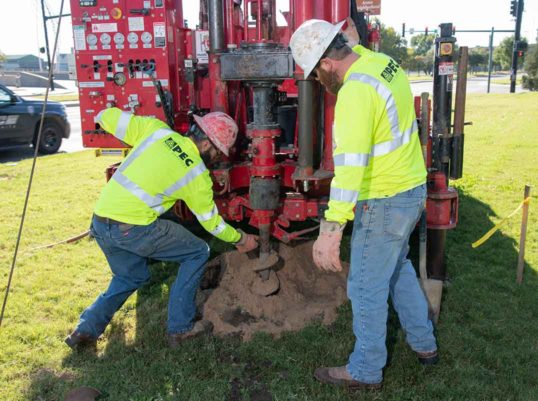Consulting Engineers: Relied On Expertise for Intricate Engineering Difficulties and Solutions
Consulting Engineers: Relied On Expertise for Intricate Engineering Difficulties and Solutions
Blog Article
A Comprehensive Overview of the Key Services Provided by Consulting Civil Engineering Professionals in Modern Building And Construction
Consulting civil design specialists are indispensable to the success of modern-day building jobs, providing a complex collection of services that deal with various obstacles. From performing detailed website evaluations and usefulness researches to making sure compliance with stringent governing frameworks, these experts lay the foundation for lasting and secure growth. Their expertise encompasses structural design and task management, which are critical for accomplishing timely and cost-efficient results. As the intricacy of building tasks remains to advance, comprehending the complete spectrum of solutions they provide ends up being increasingly necessary for stakeholders. What implications does this have for the future of building practices?
Site Analysis and Usefulness Studies
When starting any type of building and construction project, understanding the site's attributes is critical, as it directly impacts the feasibility and style of the development. Site analysis and expediency researches are crucial elements of the pre-construction phase, allowing stakeholders to make educated choices. These research studies include a detailed examination of the physical, ecological, and governing elements of the site.

By incorporating these aspects, civil engineering experts can give a holistic view of the site's stability for the desired development. Ultimately, extensive website evaluations and usefulness researches lay the foundation for effective project execution, lessening threats and maximizing source allowance.
Architectural Style and Analysis
Following an extensive site evaluation and feasibility study, the following essential stage in the building process is structural design and evaluation. This crucial solution includes the development of structural systems that make certain the security, longevity, and financial feasibility of a job. Consulting civil engineers make use of sophisticated approaches and software to review tons, tensions, and material residential or commercial properties, ensuring that styles abide by pertinent codes and criteria.
Architectural style encompasses different elements, consisting of beams, columns, structures, and load-bearing walls. By using principles of technicians and material scientific research, engineers produce structures that can stand up to environmental pressures such as wind, seismic activity, and snow tons. The evaluation phase entails precise estimations to predict the habits of these structures under different problems, ensuring they can do as meant throughout their life-span.
Additionally, consulting designers team up closely with designers and various other stakeholders to integrate structural aspects aesthetically and functionally. The deliverables usually consist of detailed drawings, specs, and comprehensive reports that promote the construction process. Inevitably, effective structural design and evaluation are crucial in lessening dangers, enhancing resources, and accomplishing successful job end results in modern-day construction.
Project Administration and Sychronisation
Reliable task monitoring and coordination are important elements of successful civil engineering services, guaranteeing that building jobs are supplied promptly, within spending plan, and to the called for top quality criteria. Consulting civil designers play a crucial role in orchestrating various project elements, from first preparation via to predict conclusion. This entails not only the technological facets of layout and building and construction yet likewise the tactical administration of resources, timelines, and stakeholders.

In addition, civil design specialists highlight the value of documents and reporting throughout the project lifecycle - geotechnical engineering in south africa. By maintaining precise records, they make sure openness and liability, which cultivates trust among all parties involved. Ultimately, skilled job monitoring and control bring about boosted task end results, straightening with customer assumptions and adding to the total success of the building and construction undertaking
Regulatory Conformity and Permitting
Effective task monitoring prepares for attending to regulative compliance and allowing demands in civil engineering tasks. Making sure adherence to regional, state, and federal laws is important for the effective execution and conclusion of any type of construction undertaking. Consulting civil design professionals play an essential function in navigating the complicated landscape of regulatory structures and permitting processes.
These experts are skilled in zoning legislations, developing codes, environmental laws, and security standards that regulate construction techniques. They conduct detailed evaluations to identify all suitable regulations, making sure that projects adhere to necessary legal needs. By working together with governmental firms and stakeholders, speaking with designers help with the allowing procedure, improving authorizations and minimizing delays.
In addition, they prepare and submit the requisite paperwork, such as website strategies, environmental influence evaluations, and design reports. This proactive technique not just fosters compliance however additionally boosts project expediency and sustainability. Inevitably, reliable regulatory compliance and permitting are necessary elements of an effective civil design task, safeguarding both the atmosphere and public welfare while adding to the total honesty and success of construction initiatives.
Sustainable Style Practices
Sustainable style methods are significantly identified as essential components in civil engineering, with a concentrate on reducing environmental impact while making the most of source effectiveness. These practices include an array of approaches targeted at advertising eco-friendly equilibrium and reducing the carbon impact of construction projects.
One trick facet of lasting style is the combination of sustainable energy sources, such as solar and wind, right into structure styles. This not only decreases reliance on nonrenewable fuel sources however likewise enhances long-term price financial savings. Furthermore, making use of sustainable products, consisting of swiftly eco-friendly or recycled sources, plays a considerable role in decreasing waste and preserving natural deposits.
Water monitoring methods, such as rainwater harvesting and reliable watering systems, are also essential in lasting style. These practices aid in lowering water usage and protecting neighborhood water environments. Moreover, environmentally delicate site preparation guarantees minimal interruption to the natural landscape and advertises biodiversity.
Consulting civil engineering experts contribute in applying these sustainable layout methods. Their knowledge permits the execution of cutting-edge services that straighten with both regulatory demands and customer goals, eventually adding to a more sustainable built environment.
Verdict
In summary, getting in touch with civil engineering experts supply crucial solutions that underpin the success of modern building jobs. Via meticulous site analyses, cutting-edge architectural style, effective job management, adherence to governing requirements, and the application of lasting techniques, these professionals add to the production of safe, reliable, and ecologically accountable developments. The integration of these crucial solutions not just enhances job outcomes however likewise promotes a sustainable future in the construction industry.
Reliable project monitoring and coordination are vital parts of successful civil engineering solutions, ensuring that building and construction projects are provided on time, within budget, and to the called for quality requirements. Consulting civil engineers play a crucial role in orchestrating different task elements, from first preparation with to forecast completion. Inevitably, proficient project management and sychronisation lead to enhanced job end results, aligning with customer expectations and contributing to the total success of the building venture.

Report this page